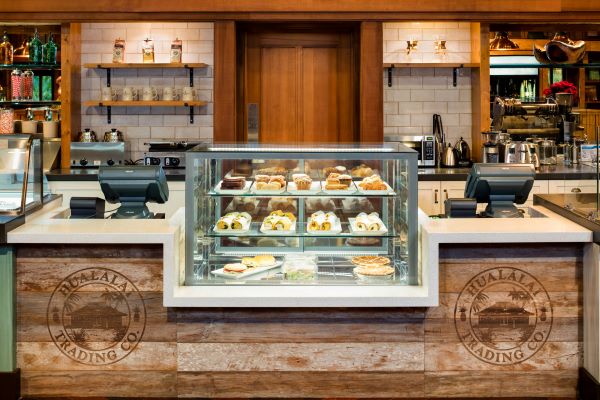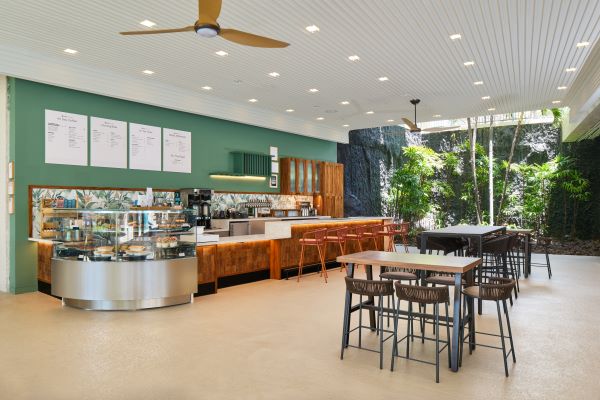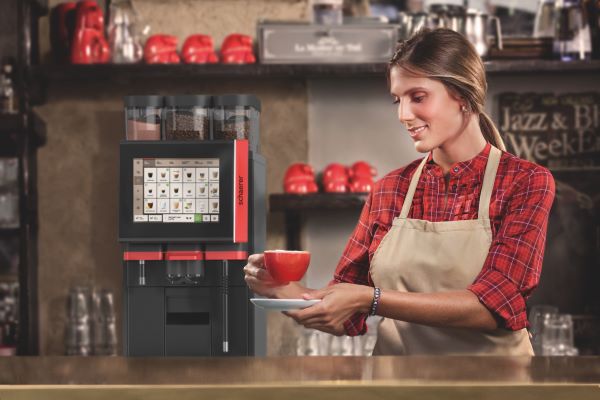Black, with sugar, cream or milk, a cappuccino or espresso, perhaps, coffee isn’t just a beverage to start the day anew; for many, it’s weaved into their daily experience and existence. It’s that important.
The serious degree to which customers think about coffee has made it a vital benchmark and baseline to assess a hotel’s overall service and customer experience. A great, delicious cup of joe can leave a lasting, positive impact; a bad one can derail it, leaving a bad taste in a customer’s mouth.
Today’s customer expects nothing less than barista-quality coffee. The days when guests were satisfied with stored filter coffee or a cappuccino with a congealed layer of foam are long gone, said Sarah Ognibeni, head of marketing at Schaerer, a Swiss manufacturer of fully automatic coffee machines.
“Just how important coffee has become for hotel guests is even reflected in review portals,” she said. “The coffee on offer at breakfast is a particularly frequent topic on these platforms and should be one more reason for hoteliers to invest in coffee quality.”
Despite guests’ expectations for good coffee, hotels sometimes don’t meet their requirements. In fact, 75% of hotel guests rate the quality of in-room coffee as poor or average, a UCC Coffee survey revealed. Additionally, 30% of the participants said the quality of coffee served in rooms would deter them from returning to the same hotel.

DIVERSE OPTIONS
Besides ensuring the quality of the coffee served, hoteliers say it is important to offer a variety of options to enhance the guest experience. While some prefer to start their day with black coffee, many will opt for a caramel latte, while some might want to try a single-estate pour-over. Additionally, with the growing popularity of plant-based milks, hotels are careful to ensure a variety of non-dairy milks.
Consider Four Seasons Resort Hualalai in Hawaii. The resort not only ensures a coffee service that showcases the local culture and community of Hawaii, but guests can also choose from four non-dairy options—soy, almond, coconut and oat milk.
“We find that having alternative dairy options has been a crucial element in the specialty coffee industry,” said Michael Hofstedt, director of F&B of Four Seasons Resort Hualalai. “It is important to provide a variety of options to enhance our guest experience for those who may have allergies or dietary limitations toward dairy.”
Besides using the latest brewing equipment for fresh coffee, the resort has a network of local purveyors and farmers that do weekly tastings with the hotel’s F&B team to ensure the highest quality beans are being sourced. The café menu is changed throughout the year to include new items and celebrate each season’s offerings, Hofstedt said.

IN-ROOM OPTIONS
In-room coffee is mostly functional, meant to provide convenience and accommodate guests in the comfort of their rooms, said Anthony Rouhana, F&B outlets manager at Outrigger Kona Resort & Spa. The resort has two venues where guests can enjoy a variety of coffees—Wailele Café and Piko Coffee & Wine Bar.
Most hotels offer coffee pods for in-room coffee service. Though it is convenient and cost-effective, these pods ultimately compromise quality, caffeine content and environmental health, said Rouhana. There are other alternatives, such as pour-over travel packs and steeping-style instant options, which resemble tea bags. Many roasters are developing these methods to maintain the quality of the final cup, he said.

MACHINE TECHNOLOGY
Automation is making high-quality coffee service a reality and hoteliers are increasingly depending on fully automatic coffee machines in the hotel bar or restaurant. The flexible use of machines also has a key role in optimizing capacity utilization, helping staff and offering guests a plus in service, such as seasonal beverage offers.
Hoteliers are increasingly opting for vending machines, which ensure greater staff and cost efficiency, while simultaneously offering guests a premium level of service, noted Ognibeni.
One example is the self-service coffee station, which is available to guests in the lobby regardless of the time of day or bar and restaurant opening hours. Whether the coffee specialties are offered free to offer guests more value and increase the quality of their stay, or whether they are chargeable, depends entirely on the hotel’s philosophy.
“In order to serve guests their favorite coffee in high quality and with little additional effort for the staff, we recommend investing in appropriate machine technologies,” Ognibeni said. Schaerer offers the ’Twin Milk System’ in the Schaerer Coffee Soul and Schaerer Coffee Skye machines.
The Twin Milk cooling unit has two separate containers and can be filled with different types of milk or alternatively with vegan plant-based drinks, Ognibeni explained.
To prepare their favorite brew, staff or guests in self-service select the corresponding beverage symbol on the coffee machine display and a latte macchiato, cappuccino or flat white flows into the cup, regardless of whether it is prepared with whole milk, low-fat milk or a plant-based drink.
However, most coffee machine failures are due to inadequate or incorrect hygiene measures, Ognibeni said, adding that the machines need to be cleaned at regular intervals.
Though the coffee machines at Outrigger Kona Resort and Four Seasons Resort Hualalai are cleaned daily, the latter implements a monthly calibration to all variables, such as water pressure and temperature to ensure the optimum level of brewing.
With hotels offering coffee machines and coffee pods in every room, ensuring sustainability can become challenging. Outrigger Kona Resort saves the coffee grounds for compost in its own gardens, said Rouhana.
“This garden will grow the Hawaiian chilies we use for our Pele’s Mocha, creating a truly cyclical process,” he said. “Due to the volume, we also offer our used grounds to anyone who may want them for home fertilizer.”
